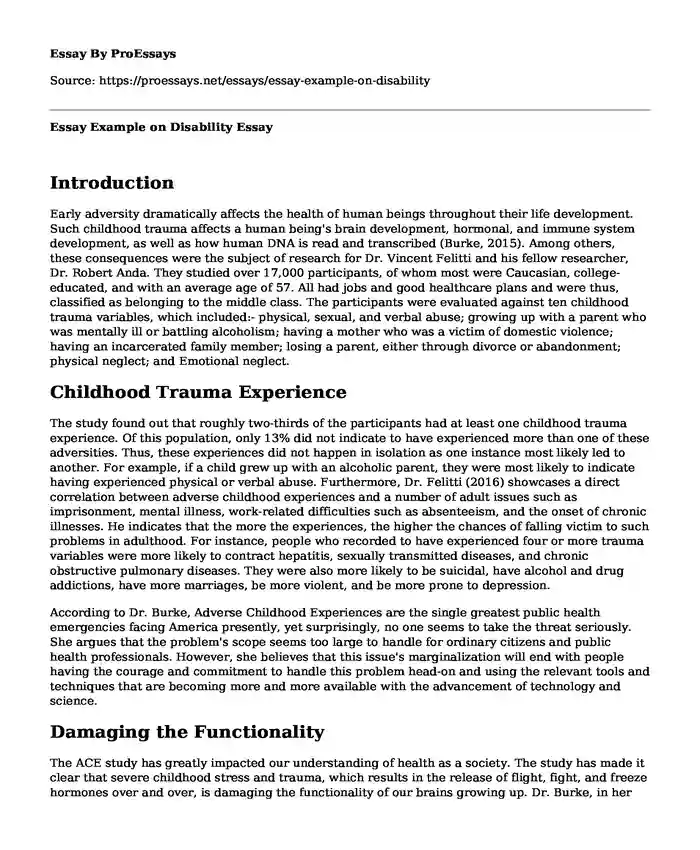Introduction
Early adversity dramatically affects the health of human beings throughout their life development. Such childhood trauma affects a human being's brain development, hormonal, and immune system development, as well as how human DNA is read and transcribed (Burke, 2015). Among others, these consequences were the subject of research for Dr. Vincent Felitti and his fellow researcher, Dr. Robert Anda. They studied over 17,000 participants, of whom most were Caucasian, college-educated, and with an average age of 57. All had jobs and good healthcare plans and were thus, classified as belonging to the middle class. The participants were evaluated against ten childhood trauma variables, which included:- physical, sexual, and verbal abuse; growing up with a parent who was mentally ill or battling alcoholism; having a mother who was a victim of domestic violence; having an incarcerated family member; losing a parent, either through divorce or abandonment; physical neglect; and Emotional neglect.
Childhood Trauma Experience
The study found out that roughly two-thirds of the participants had at least one childhood trauma experience. Of this population, only 13% did not indicate to have experienced more than one of these adversities. Thus, these experiences did not happen in isolation as one instance most likely led to another. For example, if a child grew up with an alcoholic parent, they were most likely to indicate having experienced physical or verbal abuse. Furthermore, Dr. Felitti (2016) showcases a direct correlation between adverse childhood experiences and a number of adult issues such as imprisonment, mental illness, work-related difficulties such as absenteeism, and the onset of chronic illnesses. He indicates that the more the experiences, the higher the chances of falling victim to such problems in adulthood. For instance, people who recorded to have experienced four or more trauma variables were more likely to contract hepatitis, sexually transmitted diseases, and chronic obstructive pulmonary diseases. They were also more likely to be suicidal, have alcohol and drug addictions, have more marriages, be more violent, and be more prone to depression.
According to Dr. Burke, Adverse Childhood Experiences are the single greatest public health emergencies facing America presently, yet surprisingly, no one seems to take the threat seriously. She argues that the problem's scope seems too large to handle for ordinary citizens and public health professionals. However, she believes that this issue's marginalization will end with people having the courage and commitment to handle this problem head-on and using the relevant tools and techniques that are becoming more and more available with the advancement of technology and science.
Damaging the Functionality
The ACE study has greatly impacted our understanding of health as a society. The study has made it clear that severe childhood stress and trauma, which results in the release of flight, fight, and freeze hormones over and over, is damaging the functionality of our brains growing up. Dr. Burke, in her ted talk, gives a great example of this phenomenon. She illustrates how a child is always ready to confront or flee from a bear –such as an absent or violent parent- that attacks every day. This constant emergency response results in the child's brain becoming stunted such that when confronted by a math problem, what comes into play is the bear emergency. Such despair and frustration have led to people finding solace in high-risk behaviors that do not appear to be problematic at first but rather a mere escape from depression, anger, fear, and shame (Stevens, 2012).
Conclusion
Just as Dr. Burke points out, it is high time everyone rallies together and use the study to device measures that will tackle the problem at the root. We need to integrate all societal systems, whether educational, correctional, or health-related, to replace the traditional approaches that do not seem to fit the criterion of preventing and treating Adverse Childhood Experiences.
References
Burke, N., H. (2015). How childhood trauma affects health across a lifetime. TED.
https://www.youtube.com/watch?v=uXXTLf7oouUFelitti, V. (2016).
Adverse Childhood Experiences Study. Policywise for children and families.
https://www.youtube.com/watch?v=KEFfThbAYnQ&t=77s
Stevens, J., E. (2012). The Adverse Childhood Experiences Study — the largest, most important public health study you never heard of — began in an obesity clinic. Aces Too High.
https://acestoohigh.com/2012/10/03/the-adverse-childhood-experiences-study-the-largest-most-important-public-health-study-you-never-heard-of-began-in-an-obesity-clinic/.
Cite this page
Essay Example on Disability. (2024, Jan 01). Retrieved from https://proessays.net/essays/essay-example-on-disability
If you are the original author of this essay and no longer wish to have it published on the ProEssays website, please click below to request its removal:
- Interview a Nurse Practitioner Paper Example
- Literary Analysis Essay on Social Work with Immigration and Refugee
- Paper Example on Theories of Kant and Spinoza
- The Journey to Public Health: A Grandmother's Legacy - Essay Sample
- Essay Example on Drug Distribution System: Two Types of Drugs
- Free Essay on Spanish Flu: The Worst Pandemic Of The Twentieth Century
- Free Essay Example on Moral Theory Versus Utilitarian Theory







